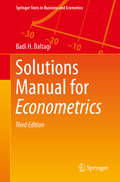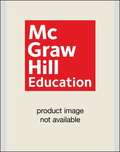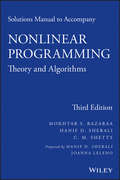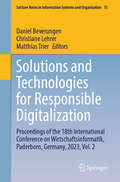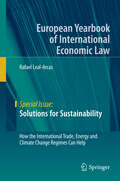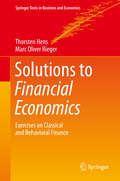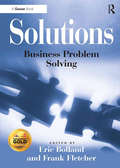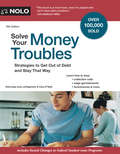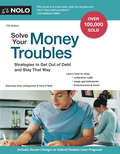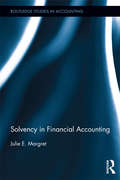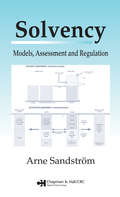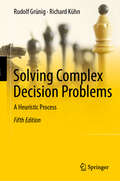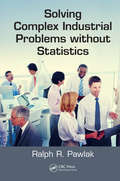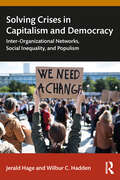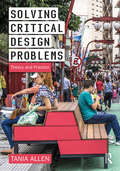- Table View
- List View
Solutions Manual for Econometrics
by Badi H. BaltagiThis Second Edition updates the Solutions Manual for Econometrics to match the fourth edition of the Econometrics textbook. It corrects typos in the previous edition and adds problems and solutions using latest software versions of Stata and EViews. Special features include empirical examples using EViews and Stata. The book offers rigourous proofs and treatment of difficult econometrics concepts in a simple and clear way, and it provides the reader with both applied and theoretical econometrics problems along with their solutions.
Solutions Manual to Accompany Essentials of Investments (Ninth Edition)
by Zvi Bodie Alex Kane Alan MarcusRevised by Fiona Chou, University of California San Diego, and Matthew Will, University of Indianapolis, this manual provides detailed solutions to the end-of-chapter problems. There is consistency between the solution approaches in the examples featured within the text and those presented in the manual.
Solutions Manual to Accompany Nonlinear Programming: Theory and Algorithms
by Hanif D. Sherali Mokhtar S. Bazaraa C. M. ShettyAs the Solutions Manual, this book is meant to accompany the main title, "Nonlinear Programming: Theory and Algorithms, Third Edition. " This book presents recent developments of key topics in nonlinear programming (NLP) using a logical and self-contained format. The volume is divided into three sections: convex analysis, optimality conditions, and dual computational techniques. Precise statements of algortihms are given along with convergence analysis. Each chapter contains detailed numerical examples, graphical illustrations, and numerous exercises to aid readers in understanding the concepts and methods discussed.
Solutions and Technologies for Responsible Digitalization: Proceedings of the 18th International Conference on Wirtschaftsinformatik, Paderborn, Germany, 2023, Vol. 2 (Lecture Notes in Information Systems and Organisation #75)
by Daniel Beverungen Christiane Lehrer Matthias TrierThis book is the second volume of proceedings from the 18th International Conference on Wirtschaftsinformatik held in Paderborn, Germany, in 2023. In the context of the global trend toward digitalization, it presents the results of innovative, high-quality research in the field of information systems and digital transformation. The book covers a broad range of topics, including digital innovation, business analytics, artificial intelligence, and IT strategy, each of which has and will continue to have significant impacts on companies, individuals and societies alike.
Solutions for Sustainability: How the International Trade, Energy and Climate Change Regimes Can Help (European Yearbook of International Economic Law)
by Rafael Leal-ArcasThis book explores links and synergies between international trade and two of the most urgent challenges of the 21st century: achieving sustainable energy (i.e., energy that is affordable, secure, and clean) and mitigating climate change. It takes the unique approach of not only examining how international trade can help achieve energy and climate goals, but also the impact of emerging tools and technologies such as smart grids and demand response, and the potential role and impact of citizens and prosumers. The book analyzes energy- and trade-related regulations in a range of jurisdictions to assess how conducive the regulation is towards achieving sustainable energy, and identifies gaps and overlaps in the existing legal framework.
Solutions to Financial Economics: Exercises on Classical and Behavioral Finance (Springer Texts in Business and Economics)
by Thorsten Hens Marc Oliver RiegerThis book offers a concise introduction to the field of financial economics and presents, for the first time, recentbehavioral finance research findings that help us to understand many puzzles in traditional finance. Tailor-made formaster’s and PhD students, it includes tests and exercises that enable students to keep track of their progress. Parts of the book can also be used at the bachelor level.
Solutions: Business Problem Solving
by Frank FletcherThere are some events in life that are inevitable, and the emergence of problems in the workplace is one. Solutions sets out to provide remedies that are accessible, practical, meaningful, and final. Well organized, and referenced to specific operations, this book provides troubleshooting and other assistance, and serves as an encyclopedic reference for answers to organizational problems for managers and practitioners. All the functional activities and operations of organizations are included, so that almost any problem or issue that may occur will be addressed in one or more chapters. Readers will be able to quickly locate, understand and use a specific tool or technique to solve a problem. The different tools available are described, or a single most useful tool indicated. The tool is then explained in depth with an example of how it can be used. The strengths and weaknesses of individual tools are identified and there are suggestions for further help. Solutions is essential for anyone wanting to learn the basics of business problem solving and those who might know the basics but want to expand their understanding.
Solutions: Workplace Answers 911:Revelations For Workplace Challenges and Firefights
by Lynne CurrySolutions offers you strategies, insights, answers and revelations Some are simple, others innovative and surprising--and all ones that can change your work life for the better. Solutions offers you sixty of the best real-life dramas--and enlightening answers from Dr. Lynne Curry's three decade weekly newspaper column run in multiple newspapers. Written by a successful management consultant and coach, Solutions offers you your personal workplace 411/911 written in Curry's warm, personal, enlightening and fun style. You Need a Solution When: You face a problem or challenge that doesn't solve easily Your work life is good--you want it to be great You want excellence or more than what comes easily You can't see past your blind spot You need an answer--and now You feel stuck--and want to move forward You're in a workplace firefight
Solvay Group: International Mobility and Managing Expatriates
by Nitin Nohria Boris Groysberg Kerry HermanMarcel Lorent, head of International Mobility at Brussels-based Solvay Group, faces decisions on the expatriation status of four of his firm's talented executives. Each decision will impact the candidate's professional and personal life, and will have implications for effective management and growth in Solvay's global markets. The case explores these issues, with a close look at Solvay's attempts to develop talent management and mobility processes that allow the firm to align its strategic needs with the complexities of its individual employees' needs and lives.
Solvay: History of a Multinational Family Firm
by Ernst Homburg Kenneth Bertrams Nicolas CoupainErnest Solvay, philanthropist and organizer of the world-famous Solvay conferences on physics, discovered a profitable way of making soda ash in 1861. Together with a handful of associates, he laid the foundations of the Solvay company, which successfully branched out to other chemicals, plastics, and pharmaceuticals. Since its emergence in 1863, Solvay has maintained world leadership in the production of soda ash. This is the first scholarly book on the history of the Solvay company, which was one of the earliest chemical multinationals and today is among the world's twenty largest chemical companies. It is also one of the largest companies in the field to preserve its family character. The authors analyze the company's 150-year history (1863-2013) from economic, political, and social perspectives, showing the enormous impact geopolitical events had on the company and the recent consequences of global competition.
Solve Joint Problems to Create and Claim Value: At-the-Table Tactics for Negotiators
by David A. Lax James K. SebeniusThe best negotiators want to create all possible value jointly, claim a full share of it, and prevent themselves from being exploited by value-claimers. In this chapter, the authors suggest some tactical guidelines that will help you be more effective at both creating and claiming value.
Solve Your Money Troubles
by Robin Leonard Amy LoftsgordonAre you overwhelmed by your debts? Feeling squeezed by the housing bust? Or simply want to get smarter about managing your money? If you're ready to regain your financial freedom, you'll find everything you need in this comprehensive guide. Solve Your Money Troubles shows you how to: prioritize debts & create a budget negotiate with creditors stop harassment by debt collectors deal with wage garnishment, car repossession, and foreclosure reduce student loan payments know what to expect if a creditor sues rebuild your credit decide if bankruptcy is the right option for you To make the process easier, Solve Your Money Troubles includes sample letters to negotiate with creditors, as well as worksheets and charts to calculate your debts and expenses and help you create a repayment plan.
Solve Your Money Troubles
by Robin Leonard Margaret ReiterFeeling overwhelmed by your debts? If you're ready to regain your financial freedom, feeling the squeeze of the housing bust or simply get smarter about managing your money, you'll find everything you need in this complete guide. Solve Your Money Troubles shows you how to: . prioritize debts . create a budget . negotiate with creditors . stop collector harassment . challenge wage attachments . contend with repossessions . respond to creditor lawsuits . qualify for a mortgage . rebuild credit . decide if bankruptcy is the right option for you To make the process easier, Solve Your Money Troubles includes sample letters to creditors, as well as worksheets and charts to calculate your debts and expenses.
Solve Your Money Troubles
by Robin Leonard J.D.Repair your credit and get out of debt with the complete guide to solving your money troubles. Feeling overwhelmed by your debts? If you're ready to regain your financial freedom, feeling the squeeze of the housing bust or simply get smarter about managing your money, you'll find everything you need in this complete guide. Solve Your Money Troubles shows you how to: prioritize debts create a budget negotiate with creditors stop collector harassment challenge wage attachments contend with repossessions respond to creditor lawsuits qualify for a mortgage rebuild credit decide if bankruptcy is the right option for you To make the process easier, Solve Your Money Troubles also includes sample letters to creditors, as well as worksheets and charts to calculate your debts and expenses and help you create a repayment plan. To make the process easier, the 13th edition of Solve Your Money Troubles includes all-new sample letters to creditors which reflect changing financial times, as well as worksheets and charts to calculate your debts and expenses and help you create a repayment plan. You'll also get fully updated state laws and new information on dealing with foreclosure.
Solve Your Money Troubles: Strategies to Get Out of Debt and Stay That Way
by Amy Loftsgordon Cara O'NeillAre you overwhelmed by debt? Facing collection calls, a wage garnishment, car repossession, or lawsuit? Solve Your Money Troubles is a comprehensive guide that provides the practical information you need to take financial control of your life. Learn how to: prioritize debts & create a budget stop harassment by debt collectors negotiate with creditors deal with wage garnishment, car repossession and foreclosure reduce student loan payments know what to expect if a creditor sues decide if bankruptcy is the right option for you, and rebuild your credit. The new edition of Solve Your Money Troubles is updated with the latest legal developments in the world of debt, credit, and bankruptcy. You’ll also find sample letters you can use when negotiating with creditors, worksheets to help you create a plan to repay your debt, and other practical forms to help you get out of debt and make a fresh start.
Solve Your Money Troubles: Strategies to Get Out of Debt and Stay That Way
by Amy Loftsgordon Cara O'NeillAre you overwhelmed by debt? If you’re facing collection calls, a wage garnishment, foreclosure, car repossession, or a lawsuit, this book is for you. Solve Your Money Troubles is a comprehensive guide that provides the practical information you need to take financial control of your life. Learn how to: prioritize debts and create a budget stop harassment by debt collectors negotiate with creditors deal with wage garnishment, car repossession, and foreclosure reduce or eliminate student loan payments know what to expect if a creditor sues decide if bankruptcy is the right option for you, and rebuild your credit. The new edition of Solve Your Money Troubles is updated with the latest legal developments in the world of debt, credit, and bankruptcy. You’ll also find sample letters you can use when negotiating with creditors, worksheets to help you create a plan to repay your debts, and other practical forms to help you get out of debt and make a fresh start.
Solved: How other countries cracked the world's biggest problems (and we can too)
by Andrew WearDenmark is set to achieve 100 per cent renewable energy by 2030. Iceland has topped the gender equality rankings for a decade and counting. South Korea&’s average life expectancy will soon reach ninety. How have these places achieved such remarkable outcomes? And how can we apply those lessons to our own communities? The future we want is already here - it's just not evenly distributed. By bringing together for the first time tried and tested solutions to society's most pressing problems, from violence to inequality, Andrew Wear shows that the world we want to live in is already within reach. Solved is a much-needed dose of optimism in an atmosphere of doom and gloom. Informative, accessible and revelatory, it is a celebration of the power of human ingenuity to make the future brighter for everyone.
Solvency II: Stakeholder Communications and Change
by Gabrielle O'DonovanWith the Solvency II deadline approaching, and full implementation expected from January 2016, affected entities are at varying states of readiness with embedding Solvency II into everyday practices becoming a major focus. Programme stakeholder communications needs to be robust to secure compliance and buy-in on both internal and external fronts. If your CEO fails to communicate to the markets your organization's ability to deliver on the EU Directive, or if a local Regulator finds that your Board has failed to embed a risk culture that is aligned with Solvency II, your ability to operate in the Solvency II world will be questioned. Solvency II: Stakeholder Communications and Change explains how to negate such risks. Gabrielle O'Donovan demonstrates how to approach stakeholder communications and change management in a structured and disciplined way, framed by the EU Directive's governance requirements. She demonstrates how to use a variety of tools and techniques to engage people with change and embed new ways of doing things. She reveals how to embed risk consciousness into your culture, helping you secure Solvency II approval and operate successfully in the Solvency II world. Based on the author's original research and the latest industry developments, Solvency II: Stakeholder Communications and Change is well-structured, readable and above all essential for all involved in Solvency II implementation.
Solvency in Financial Accounting (Routledge Studies in Accounting)
by Julie E. MargretThis book examines the notion of solvency at law and in accounting; and reveals inconsistent ways of determining solvency therein. Solvency is a critical commercial financial attribute. Quantifying solvency has been of concern to many across time, particularly with regard to business continuity. This study demonstrates that conventional financial statements are deficient in establishing the financial state of an entity, and equally lacking in quantifying its state of solvency. The book contributes to the literature by drawing on real-world observations of how the meshing of commercial and legal foundations creates the environment in which accounting must serve. The aim of this work is to provide insights into what changes to existing financial reporting systems might assist business in mitigating unexpected business failures and the criticism of accounting in the aftermath. Drawing mainly on major Australian cases, links highlight associations between the language of accounting and the data in financial statements; and situations that may be generalised - that have international significance. Hence, this work is relevant to the interests of a wide range of readers. It is also important from a public policy perspective as regulators grapple with a commercial environment heavily influenced by sometimes perceived scandalous corporate activity. Solvency is a topical and ongoing issue for business and financial accounting.
Solvency: Models, Assessment and Regulation
by Arne SandstromUntil now there were no published analyses of the recent solvency work conducted in Europe, specifically the risk categories proposed by the International Actuarial Association (IAA). Answering the insurance industry's demand in the wake of the EU Solvency II project, Solvency: Models, Assessment and Regulation provides a concrete summary and revie
Solving Business Problems Using a Calculator (Sixth Edition)
by Mildred K. PoliskySolving Business Problems Using a Calculator follows current trends in office technology, teaches the touch method, explains common calculator features, and emphasizes business problem solving. In the sixth edition, the text's popular features have been maintained along with its concise explanations and emphasis on the use of the calculator as a problem-solving tool.
Solving Complex Decision Problems: A Heuristic Process
by Rudolf Grünig Richard KühnMaking decisions is certainly the most important task managers are faced with, and it is often a very difficult one. This book offers a procedure for solving complex decision problems step by step. Unlike conventional practice, the book focuses on problem analysis, on developing solution options and on assessing them. In this fifth edition of the book, the authors present simplified, actionable guidelines that can be easily applied to the individual steps in the heuristic procedure. The book is intended for decision-makers at companies, non-profit organizations and in public administration whose work involves complex problems. It will also benefit students and participants in executive courses.
Solving Complex Industrial Problems without Statistics
by Ralph PawlakPresenting: Problem Solving Sans Statistics Enhance your problem-solving skills, and improve your company’s profitability using the methods outlined in Solving Complex Industrial Problems without Statistics. Introducing a process that involves working through problems and solutions without relying on complicated statistical design or analysis, this book pulls away from data-driven thinking and provides the problem solver with a new way of solving problems. Utilizing techniques that have been applied in facilities throughout the U.S., Canada, Italy, China, and Hong Kong, it demonstrates the use of process and problem differences and similarities, and provides a better understanding of analogous comparisons. The book incorporates visual analysis tools and problem examples in a format that facilitates comprehension and learning, presents novel concepts that do not require numbers or statistics, and provides a better understanding of the solution system/process overall. Each chapter presents new information, as well as case studies that include: Different problem situations Short histories detailing the operation, condition, and circumstances that were present at the time of each study Photographs, sketches, or tables with simple explanations to describe the circumstances, conditions, and the actions taken Methods of solution in rudimentary form Chapter summaries to review important mechanisms and workings Final summaries to tie together the important methods and techniques that facilitate easy problem solutions Solving Complex Industrial Problems without Statistics provides valuable insight into the solution of complex quality and manufacturing problems, without the use of statistics, and is essential to anyone involved in quality, control, problem-solving activities, or total quality management.
Solving Crises in Capitalism and Democracy: Inter-Organizational Networks, Social Inequality, and Populism
by Jerald Hage Wilbur C. HaddenDemocratic capitalism is beset with many problems producing rising inequality and growing authoritarianism. Examples include homelessness, food insecurity, child poverty, mass killings, and rising antisemitism. These problems encourage the election of authoritarian leaders. This book describes new strategies to promote inclusion and reduce inequality that do not require D.E.I. policies or affirmative action, reduce government spending without wholesale firings and in the process make government more effective, and reduce individual distrust while increasing people’s willingness to donate time and money to important causes that help others and the world.The new strategies create systematic coordinated inter-organizational networks or SCIONs to achieve the following four objectives: Increase the amount and radicalness of product or service innovation Create a more diverse labor force with more and more varied skills Make health and welfare programs more efficient and effective Restore the balance between law and freedom in community safety As a new mode of coordination, SCIONs provide to platforms for continued dialogue among diverse viewpoints, decentralize problem solving, and stimulate considerable organizational adaptiveness. They overcome the limitations of market and state coordination.This macro sociological theory offers policy guidelines that might lead to future jobs for sociologists, provide tools to overcome managerial satisficing, and speed responses to change. A detailed case study is provided with a discussion of the feasibility of creating SCIONs and whether or not elites will resist this new coordination mode. Given the broad range of topics, this book is relevant for many courses in the social sciences, for those interested in policy and social change, as well as the general public.
Solving Critical Design Problems: Theory and Practice
by Tania AllenSolving Critical Design Problems demonstrates both how design is increasingly used to solve large, complex, modern-day problems and, as a result, how the role of the designer continues to develop in response. With 13 case studies from various fields, including program and product design, Tania Allen shows how types of design thinking, such as systems thinking, metaphorical thinking, and empathy, can be used together with methods, such as brainstorming, design fiction, and prototyping. This book helps you find ways out of your design problems by giving you other ways to look at your ideas, so that your designs make sense in their setting. Solving Critical Design Problems encourages a design approach that challenges assumptions and allows designers to take on a more critical and creative role. With over 100 images, this book will appeal to students in design studios, industrial and product design, as well as landscape and urban design.
